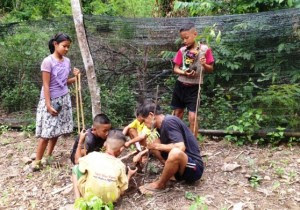On June 5, 2014, the Karen Environmental and Social Action Network (KESAN) organised an event commemorating the World Environment Day in one of the indigenous Karen areas on the Salween River in Mutraw District (Papun) in Burma. A total of 200 people, including students, youth, parents, teachers and community leaders, attended.
 The Karen people traditionally rely on the surrounding environment – the rivers and forests, to support each other for their survival and existence. The forest plays a vital role in the everyday lives of the Karen people in providing us with food, shelter, medicines, and other non-timber forest products. It is our duty, therefore, as Karen people, to protect and conserve our environment and to do so in an effective and sustainable way as our ancestors have done for generations. It is important for Karen people to understand that our environment is integral to our identity as a people.
The Karen people traditionally rely on the surrounding environment – the rivers and forests, to support each other for their survival and existence. The forest plays a vital role in the everyday lives of the Karen people in providing us with food, shelter, medicines, and other non-timber forest products. It is our duty, therefore, as Karen people, to protect and conserve our environment and to do so in an effective and sustainable way as our ancestors have done for generations. It is important for Karen people to understand that our environment is integral to our identity as a people.
Saw Samson, a retired schoolteacher who took part at the World Environment Day spoke to Karen News about the importance of the environment to Karen people. “This day is very important for me personally because environment is important for our well-being, specifically water and forest are foundational for our family and local community… if our environment is destroyed we would face natural disaster such as drought, decreased water quantity which will consequently impact our survival.”
Environmental problems such as global warming, climate change, drought, deforestation, pollution, and extinction of biodiversity have been internationally recognized and it is also significantly important for Karen people to become aware of these issues and help to protect and engage in environmental awareness so that environmental resources will be sustainably and efficiently managed and used.
In addressing the key message during the event, Pu Ku Thay, one of the key-note speakers, asserted that part of the environmental degradation in Burma was due to the Burmese government’s economic system of rapid development which encouraged aggressive extraction of environmental resources such as logging and mining in an unsustainable manner and also ignored the concerns of local village communities.
Two days prior to World Environment Day, KESAN organised environmental awareness training on the negative impacts of deforestation and large scale development project like dam construction. Activities that were carried out during the environment day included clean up of the stream and planting a variety of fruit trees in the community garden.
Saw Samson stressed that there was a need to increase environmental awareness among local communities in order to help protect and conserve the forests by replanting more trees and also empowering them to be more engaged in environmental management activities.



